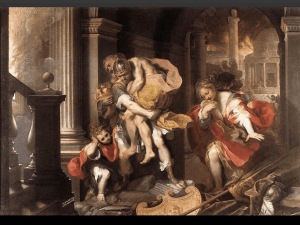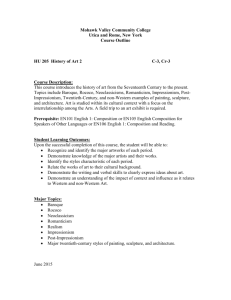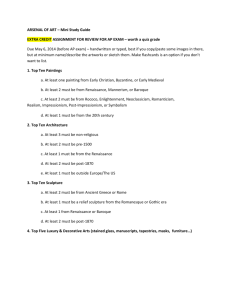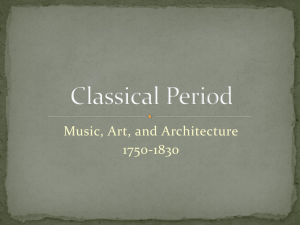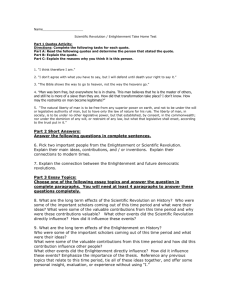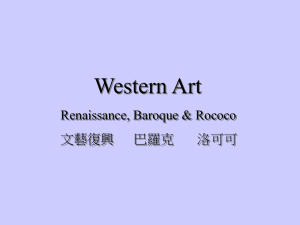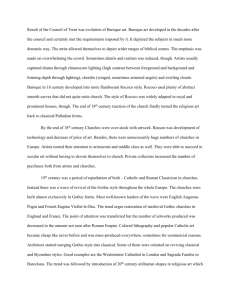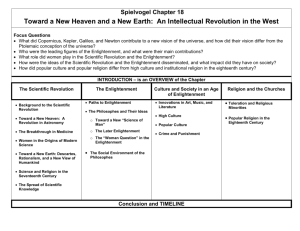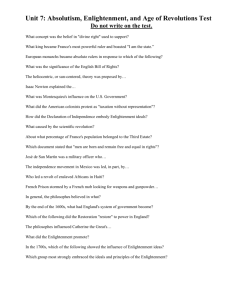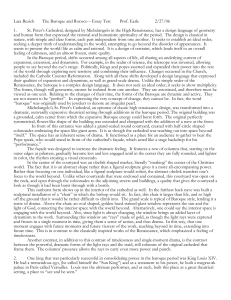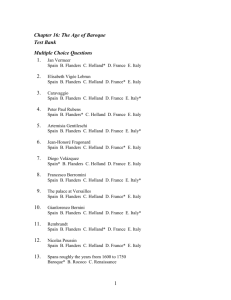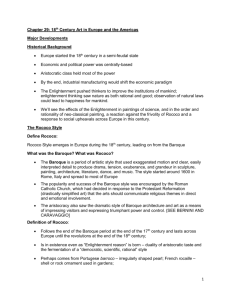Course Calendar
advertisement
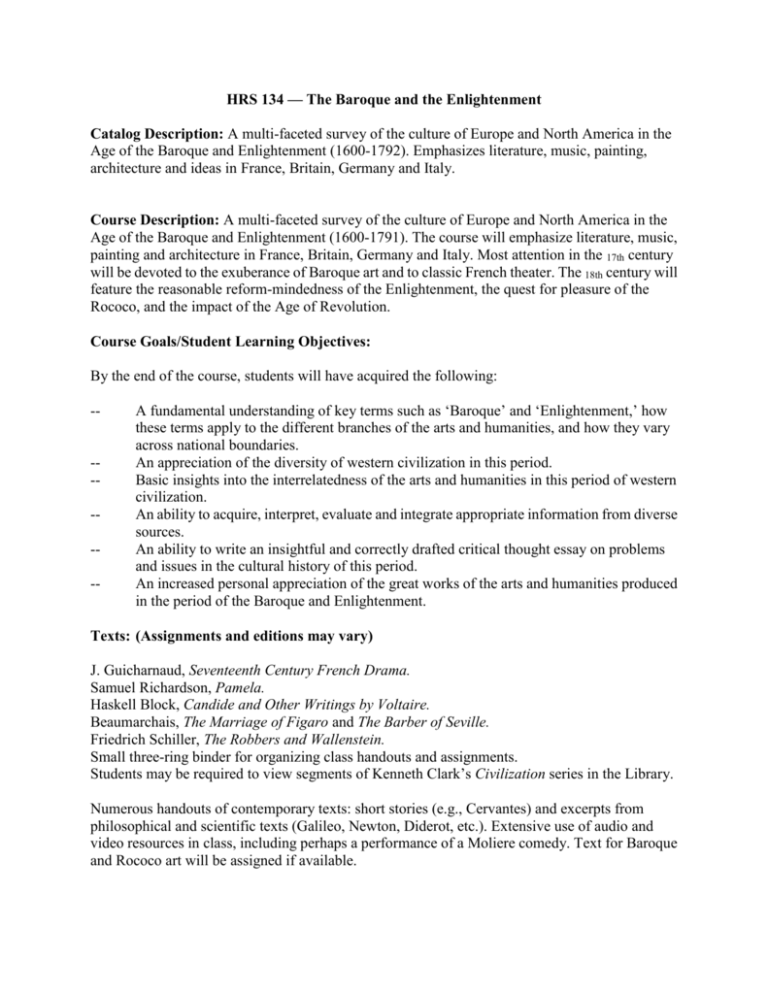
HRS 134 — The Baroque and the Enlightenment Catalog Description: A multi-faceted survey of the culture of Europe and North America in the Age of the Baroque and Enlightenment (1600-1792). Emphasizes literature, music, painting, architecture and ideas in France, Britain, Germany and Italy. Course Description: A multi-faceted survey of the culture of Europe and North America in the Age of the Baroque and Enlightenment (1600-1791). The course will emphasize literature, music, painting and architecture in France, Britain, Germany and Italy. Most attention in the 17th century will be devoted to the exuberance of Baroque art and to classic French theater. The 18th century will feature the reasonable reform-mindedness of the Enlightenment, the quest for pleasure of the Rococo, and the impact of the Age of Revolution. Course Goals/Student Learning Objectives: By the end of the course, students will have acquired the following: -- ------ A fundamental understanding of key terms such as ‘Baroque’ and ‘Enlightenment,’ how these terms apply to the different branches of the arts and humanities, and how they vary across national boundaries. An appreciation of the diversity of western civilization in this period. Basic insights into the interrelatedness of the arts and humanities in this period of western civilization. An ability to acquire, interpret, evaluate and integrate appropriate information from diverse sources. An ability to write an insightful and correctly drafted critical thought essay on problems and issues in the cultural history of this period. An increased personal appreciation of the great works of the arts and humanities produced in the period of the Baroque and Enlightenment. Texts: (Assignments and editions may vary) J. Guicharnaud, Seventeenth Century French Drama. Samuel Richardson, Pamela. Haskell Block, Candide and Other Writings by Voltaire. Beaumarchais, The Marriage of Figaro and The Barber of Seville. Friedrich Schiller, The Robbers and Wallenstein. Small three-ring binder for organizing class handouts and assignments. Students may be required to view segments of Kenneth Clark’s Civilization series in the Library. Numerous handouts of contemporary texts: short stories (e.g., Cervantes) and excerpts from philosophical and scientific texts (Galileo, Newton, Diderot, etc.). Extensive use of audio and video resources in class, including perhaps a performance of a Moliere comedy. Text for Baroque and Rococo art will be assigned if available. Evaluation: ----- Three quizzes: scantron style. Each worth 10% One Diagnostic Essay of 2-3 pages. Worth 10% Three thought papers of about five pages. Each worth 20% Class attendance and participation will affect borderline grades. Course Calendar Week 1: Introduction — course concepts; geography; history; classicism and the Renaissance. Week 2: The Baroque. Baroque architecture in the aristocratic tradition: cities and palaces in the 17th century. The Age of Louis XIV. Versailles. Drama in the Classical Age. Week 3: Diagnostic Essay Due. The tragedies of Racine and Corneille. Classicism in the 17th century. Excerpts from Guicharnaud, Seventeenth Century French Drama. Week 4: Baroque painting in Italy, France, Germany and Spain: exuberance, vitality, brilliance and expressiveness on canvas. Week 5: The comedies of Moliere. Excerpts from Guicharnaud: Tartuffe and Le bourgeois gentilhomme. Week 6: Quiz #1 (40 minutes). Science and reason in the 17th century: the Scientific Revolution in astronomy; the philosophy of Descartes. Week 7: First Thought Essay Due. Scientific Revolution continued. Transition to the 18th century. Was ist Aufklarung? (What is the Enlightenment? The Smile of Reason). Week 8: What is the Rococo (the pursuit of pleasure)? Rococo painting in France, Germany and Italy. Week 9: The Enlightenment in France. Voltaire’s Candide and other works. Ecrasez l’infame (superstition, intolerance, ignorance and thought control). Week 10: The world of the aristocratic court in the 17th and 18th centuries. The evolution of the baroque concerto from Corelli to Bach and Handel. Week 11: Quiz #2 (40 minutes). England in the 18th century. The persistence of the classical influence. Rousseau’s influence and the cult of sentimentality. A servant girl’s struggle for virtue in Samuel Richardson, Pamela. Week 12: Second Essay Due. Rococo architecture in Central Europe — Germany and Austria. Gardens in Europe and North America: the passage from the classical Italian garden to the English garden. Week 13: Beaumarchais, The Marriage of Figaro and The Barber of Seville. The French comedy (Rococo) in the Age of Revolution (Enlightenment). Week 14: The emergence of the classical tradition in music: Haydn, Mozart and Beethoven. Order and sentiment. Week 15: Germany comes of age. German classical drama in the Age of the French Revolution. The tragedies of Friedrich Schiller. Week 16: Exam week. Quiz #3. Third Essay Due.
